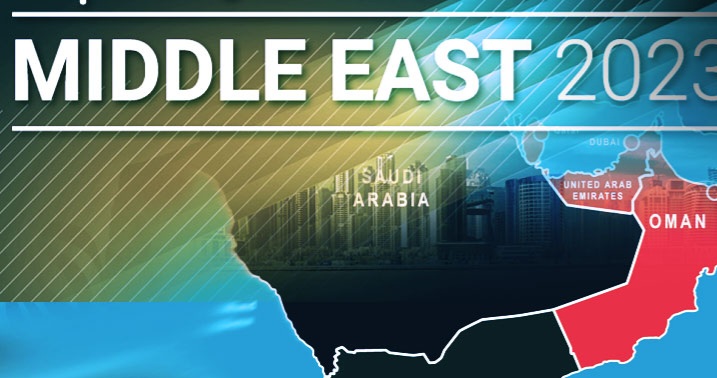In the meantime, Chinese President Xi Jinping’s visit to Riyadh in the early days of January and increase in cooperation between Saudi Arabia and Russia in energy policies, including cutting down OPEC+ output, showed that Riyadh is seeking to distance itself from Washington.
However, Bahrain made no considerable moves last year and contrary to Saudi Arabia and the UAE, the Bahraini rulers did not move to reconcile with Qatar. This marginal role in the (Persian) Gulf Cooperation Council is expected to continue for Manama. There are no signs Bahrain will move towards playing an extinguished role in 2023. Even during the World Cup in Qatar, despite the fact that Doha hosted the UAE President and the Crown Prince of Saudi Arabia, none of the high-ranking Al Khalifa officials participated in the high-profile event. Even while many hotels in Dubai and Riyadh hosted football fans and tourists, Bahrain was much less affected by the international sports event in Qatar than its other Arab neighbors, something driven by the strained relations with Doha.
New Arab news website reports that probably Kuwait, as another (P) GCC member, will continue its traditional role as a neutral and mediating country in the region in the new year, and Qatar is also likely to think of hosting bigger international events. These flamboyant and long steps by Qatar are driven by the aim of using the soft power of diplomacy. The Qataris are eyeing a bid for hosting the 2036 Summer Olympics in the near future.
Yemen war stagnation
Yemen war is one of the obsessions in West Asia that would enter its ninth year in the coming spring. Over the past year, a state of no-war-no-peace has prevailed in Yemen, but it cannot be labeled a ceasefire because of the occasional Saudi attacks. Still, a state of stagnation for war in Yemen is widely expected for this year. An array of reasons is driving this situation. On the one hand, Western allies and even the UN do not press Saudi Arabia for war end, and the energy crisis in the West has de-priortized humanitarian situation of the Yemeni people for the Western countries. On the other hand, Saudi Arabia is not able to wage a full-scale campaign and continuous attacks against Yemen because the Yemenis have the military capability to retaliate with ballistic missiles and have already attacked the Dubai airport and Aramco oil facilities in Jeddah, proving their capability to strike back. Therefore, the continuation of the current stagnant situation in Yemen will be the most likely in 2023.
Thomas Juneau, an assistant professor at the Graduate School of Public and International Affairs at the University of Ottawa, tells New Arab website that Ansarullah will very likely continue its dominance in Sana’a, while the Western and Saudi-backed administration in Aden is far from being able to build internal unity against Sana’a. This means that the Saudi-backed forces’ incapability to create a united front in front of Sana’a is one of the main reasons of continuation of no-war-no-peace situation.
Abraham Accords going nowhere
The normalization process between the Israeli regime and the Arab states in 2023 depends more on the policies of the hard-line Israeli government. Having in mind that the ruling far-right in Israel prioritizes the Arabs inside the occupied Palestine rather than those outside Palestinian borders, it can be hardly said that this year Tel Aviv would have a chance to advance the normalization process.
The hardliners in Tel Aviv government have an isolationist approach, and for them, domestic policy comes before foreign policy. At the same time, the extremist actions of the religious fundamentalists will probably lead to some tensions in relations with Western countries and the US. Last month, the Europol halted its cooperation deal with Tel Aviv as far-right took office.
On the other hand, one of the main drivers of the normalization was the insistence of Trump administration. Therefore, in the event of tensions in the relations between Tel Aviv and Western countries and mainly the US, the stimulus for normalization would disappear. Even people like National Security Minister Itmar Ben-Gvir in Tel Aviv repeat the rhetoric for full occupation of the West Bank, and in this case, considering that the occupation of the West Bank is a violation of UN resolutions, the possibility of escalated tensions between Washington and Tel Aviv will be high, and as a result, resumption of normalization would have slimmer chances.
Long-term Ukraine war ramifications
The Russian war in Ukraine was a big change in the world game whose consequences are felt across West Asia. After the war, such global challenges as famine, high food prices, and high global debts compounded, giving the world economic outlook a negative label. The risks of global food insecurity are high for Persian Gulf Arab states and higher prices can impact their regional and international stability. Arab and African countries like Egypt, Lebanon, Jordan, Somalia, and Sudan face serious food security challenges. This situation may trigger supports to them from the Persian Gulf monarchies.
A regional analyst suggests that the world food price hikes in 2008
made a cause for political instability in Syria, Libya, and Tunisia, and
if food insecurity continues in 2023, regional countries may witness
political quakes. Persian Gulf monarchies are no exception to this
possibility.
/129

